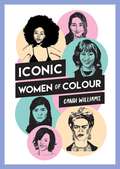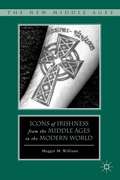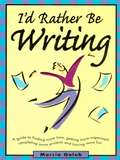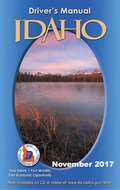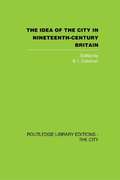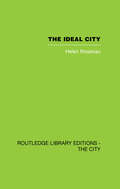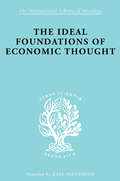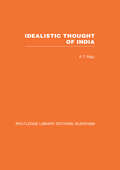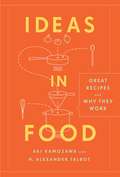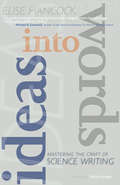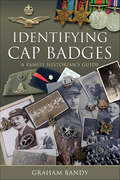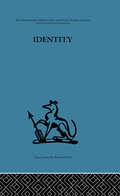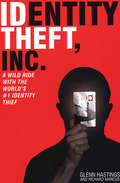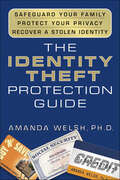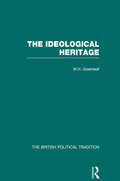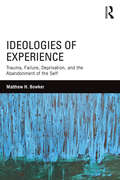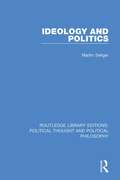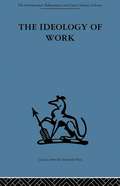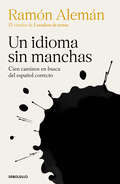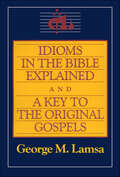- Table View
- List View
Iconic Power
by Jeffrey C. Alexander Dominik Bartma´nski Bernhard GiesenAcollection of original articles that explore social aspects of the phenomenon of icon. Having experienced the benefits and realized the limitations of so called 'linguistic turn', sociology has recently acknowledged a need to further expand its horizons. "
Iconic Women of Colour: The Amazing True Stories Behind Inspirational Women of Colour
by Candi WilliamsDiscover the fascinating stories behind 38 iconic women of colour, all of them ground-breakers, risk-takers and game-changers. Whether they are sportswomen, scientists, activists or superstars, every one of these women has been a trailblazer in their field, and deserves to have her achievements celebrated the world over. Be empowered and inspired by their extraordinary life stories, their awesome achievements and their wonder-words of wisdom with this pocketbook of remarkable women, and prepare to be introduced to your new superheroes.
Icons Of Irishness From The Middle Ages To The Modern World
by Maggie M. WilliamsFrom majestic Celtic crosses to elaborate knotwork designs, visual symbols of Irish identity at its most medieval abound in contemporary culture. Consdering both scholarly and popular perspectives this book offers a commentary on the blending of pasts and presents that finds permanent visualization in these contemporary signs.
I'd Rather Be Writing: A Guide to Finding More Time, Getting Organized, Completing More Projects and Having Fun
by Marcia GolubA published novelist and editor offers advice and cheery companionship through the processes associated with professional writing: finding time, dealing with insurmountable obstacles, getting organized, and completing projects. Annotation copyrighted by Book News, Inc. , Portland, OR
Idaho Driver's Manual (November #2017)
by The Idaho Transportation Department Division of Motor VehiclesThis handbook paraphrases the language of the Idaho Motor Vehicle Code. DMV handbooks are designed as road rules and regulations guides for new drivers and new Idaho residents. The driving manuals can help you learn the skills and laws you need to be a safe driver and help you prepare for your driving tests.
The Idea of the City in Nineteenth-Century Britain
by B. I. ColemanIn nineteenth-century Britain, ahead of the rest of the world in economic development, many towns and cities grew to a size that only London had attained before. This volume focuses on the intellectual and controversial response of the period's leading men and women to the key issues of urbanization and its surrounding social problems. The extracts selected date from 1785 to 1909, and are drawn from the writings, reports and speeches of admirers of city life and its most passionate critics, optimists and alarmists, advocates of back-to-the-land panaceas, and reformers who aspired to control and reform cities. Contemporaries quoted include Dickens, Cobbett, Carlyle, Disraeli, Engels, Mrs Gaskell, Ruskin, Joseph Chamberlain, William Morris, Charles Booth, H.G. Wells and Seebohm Rowntree. In a valuable introduction the editor indicates the main preoccupations of the debate abotu the city, proposes a periodization for it, adn shows its connections with other controversies and issues, as Victorian Britain found itself entering an 'age of great cities'. This book was first published in 1973.
The Ideal City: Its Architectural Evolution in Europe
by Helen RosenauThe concept of the 'ideal city' is, perhaps, more important today - when planners and architects are so firmly confined by considerations of our immediate environment - than ever before. Yet it is a concept which has profoundly influenced the western world throughout history, both as a regulative model and as an inspiration. Rosenau traces the progress of the concept from biblical sources through the hellenistic and Roman empires to the Renaissance and the later Age of Enlightenment, when the emphasis shifted from religious to social considerations. She goes on to discuss the resultant nineteenth-century ideal planning, when the idea of social betterment was approached with a specific and conscious effort. This book was first published in 1983.
The Ideal Foundations of Economic Thought (International Library of Sociology)
by Werner StarkPublished in 1998, The Ideal Foundations of Economic Thought is a valuable contribution to the field of Sociology & Social Policy.
Idealistic Thought of India: Buddhism: Idealistic Thought Of India (Routledge Library Editions: Buddhism)
by P T RajuWhen first published in 1953, metaphysical idealism was still the dominant philosophy of India. This volume depicts the metaphysical strands of the life and philosophy of India in the light of those of the West and brings out the deeper implications of idealistic metaphysics.
Ideas in Food: Great Recipes and Why They Work: A Cookbook
by Aki Kamozawa Alexander H. TalbotAlex Talbot and Aki Kamozawa, husband-and-wife chefs and the forces behind the popular blog Ideas in Food, have made a living out of being inquisitive in the kitchen. Their book shares the knowledge they have gleaned from numerous cooking adventures, from why tapioca flour makes a silkier chocolate pudding than the traditional cornstarch or flour to how to cold smoke just about any ingredient you can think of to impart a new savory dimension to everyday dishes. Perfect for anyone who loves food, Ideas in Food is the ideal handbook for unleashing creativity, intensifying flavors, and pushing one's cooking to new heights. This guide, which includes 100 recipes, explores questions both simple and complex to find the best way to make food as delicious as possible. For home cooks, Aki and Alex look at everyday ingredients and techniques in new ways--from toasting dried pasta to lend a deeper, richer taste to a simple weeknight dinner to making quick "micro stocks" or even using water to intensify the flavor of soups instead of turning to long-simmered stocks. In the book's second part, Aki and Alex explore topics, such as working with liquid nitrogen and carbon dioxide--techniques that are geared towards professional cooks but interesting and instructive for passionate foodies as well. With primers and detailed usage guides for the pantry staples of molecular gastronomy, such as transglutaminase and hydrocolloids (from xanthan gum to gellan), Ideas in Food informs readers how these ingredients can transform food in miraculous ways when used properly. Throughout, Aki and Alex show how to apply their findings in unique and appealing recipes such as Potato Chip Pasta, Root Beer-Braised Short Ribs, and Gingerbread Soufflé. With Ideas in Food, anyone curious about food will find revelatory information, surprising techniques, and helpful tools for cooking more cleverly and creatively at home. From the Hardcover edition.
Ideas into Words: Mastering the Craft of Science Writing
by Elise Hancock"I am so proud to be Elise's student. Read this book and I suspect you will be too."—from the foreword by Robert Kanigel, author of The Man Who Knew InfinityFrom the latest breakthroughs in medical research and information technologies to new discoveries about the diversity of life on earth, science is becoming both more specialized and more relevant. Consequently, the need for writers who can clarify these breakthroughs and discoveries for the general public has become acute. In Ideas into Words, Elise Hancock, a professional writer and editor with thirty years of experience, provides both novice and seasoned science writers with the practical advice and canny insights they need to take their craft to the next level. Rich with real-life examples and anecdotes, this book covers the essentials of science writing: finding story ideas, learning the science, opening and shaping a piece, polishing drafts, overcoming blocks, and conducting interviews with scientists and other experts who may not be accustomed to making their ideas understandable to lay readers. Hancock's wisdom will prove useful to anyone pursuing nonfiction writing as a career. She devotes an entire chapter to habits and attitudes that writers should cultivate, another to structure, and a third to the art of revision. Some of her advice is surprising (she cautions against slavish use of transitions, for example); all of it is hard-earned, astute, and wittily conveyed. This concise guide is essential reading for every writer attempting to explain the world of science to the rest of us.
Identification and Mitigation of Large Landslide Risks in Europe: Advances in Risk Assessment
by C. Bonnard F. Forlati C. ScaviaLarge landslides affect many mountain valleys in Europe. They are characterised by a low probability of evolution into a catastrophic event but can have very large impacts on population, infrastructures and the environment. This impact is becoming more and more pronounced due to increasing tourism and the construction of new roads and railways in m
Identification Of Children With Visual Impairment And Assessment Of Needs - NSOU (SEVI - 31)
by Netaji Subhas Open UniversityPublished by Netaji Subhas Open University, The Bachelor of Education Programme through Open and Distance Learning Mode contains the compulsory course with 5 units in it.
Identifying Cap Badges: A Family Historian's Guide
by Graham BandyThis book is an invaluable ‘tool of the trade’ for anyone trying to identify or interpret photos. – Peter Hart, Military Historian Identifying Cap Badges is the book that has been missing from the bookshelves of family historians, military enthusiasts, and badge collectors alike. It is quite easy to find an erudite book on military cap badges, but you could spend hours, if not days, plodding through hundreds of pictures to find a match for the one you hold. Sometimes you may not find it at all! These learned badge collector's books have one major flaw; they are pictured and discussed in 'order of precedence', that is to say, from the earliest formed regiments to the latest, with separate sections on medical, engineers, cavalry, infantry, etc. This can be most confusing to those uninitiated into the 'dark arts' of military badges. Thus, if you do not know the name or 'original number' of your regiment in this order of precedence, you can be flummoxed! This, combined with all the different crowns, laurels, animals, mythological beasts and castles, can prove more than a little daunting, even to ex soldiers themselves! In this book you will find badges ordered by what is on the badge itself; be it a dragon, sphinx or castle, horse, lion or tiger. This is badge identification in minutes, rather than hours, with added information on dating badges and many comparison photographs alongside all the pictures of the badges. Added to these pictures are short histories of the regiments and 'family trees' plotting the antecedents of today's units.
Identifying Trees of the West: An All-Season Guide to Western North America
by Lois DeMarco Jay MengelA field guide to every common tree in Western North America, with hundreds of color photos. Learn how to recognize trees you see every day by their bark; branching patterns; fruits, flowers, or nuts; and overall appearance. Created for in-the-field or at-home use, this guide is an easy-to-use resource that covers every common tree in western North America—from the eastern base of the Rocky Mountains to the Pacific coast. Clearly written for both beginning and advanced botanists, it provides tips for identification throughout a tree&’s lifespan and in every season of the year.
Identity: Mental health and value systems
by Kenneth SoddyTavistock Press was established as a co-operative venture between the Tavistock Institute and Routledge & Kegan Paul (RKP) in the 1950s to produce a series of major contributions across the social sciences. This volume is part of a 2001 reissue of a selection of those important works which have since gone out of print, or are difficult to locate. Published by Routledge, 112 volumes in total are being brought together under the name The International Behavioural and Social Sciences Library: Classics from the Tavistock Press. Reproduced here in facsimile, this volume was originally published in 1961 and is available individually. The collection is also available in a number of themed mini-sets of between 5 and 13 volumes, or as a complete collection.
Identity Theft, Inc.: A Wild Ride with the World's #1 Identity Thief
by Richard Marcus Glen HastingsIdentity theft is the crime of this century. Just ask Frank Abagnale of Catch Me If You Can fame. He states so in the Q&A of the latest edition of that book. So here, then, is the true-crime book of this century. This is the first book on the subject from the inside, told by someone whos assumed hundreds of identities and become rich off it. Not only does the author reveal how ID theft is done, he tells loads of wildly unbelievable but true stories about his impersonations as they led to riches. Some of them are as funny and outrageous as they are amazing.At the same time he tells people how to protect themselves from the gangs of ID thieves thriving in the real and virtual worlds of today, and as he explains in his foreword, Glenn Hastings is writing this book to repent for his crimes. While committing them, he failed to take into account the damage they caused his victims. He states that had he continued on his massive trail of ID and credit fraud, he could have conceivably made a billion dollars. But enough was enough and ultimately he had to do the right thing.
The Identity Theft Protection Guide
by Amanda WelshPROTECTIONPREVENTIONREPAIRIdentity theft is the fastest-growing category of crime in the United States today, and dealing with privacy and identity issues has become an essential part of life in our modern society. Each chapter in The Identity Theft Protection Guide contains a self-quiz to identify personal areas of concern, information to help you "take action," and more. This book shows you how to:* Minimize the risk of identity theft* React if your identity is stolen* Obtain and repair credit and insurance reports, and more* Deal with direct marketers, junk mailers, and telephone solicitors* Stop surveillance from GPS devices and cell-phone cameras* Keep your kids safe online* And much more!These valuable survival skills can no longer be considered optional--they are essential for life in today's society. Amanda Welsh's The Identity Theft Protection Guide is the most complete, authoritative, and easy-to-use resource on this crucial topic.
Ideological Heritage Vol 2
by William Howard GreenleafFirst Published in 2004. Routledge is an imprint of Taylor & Francis, an informa company.
Ideologies of Experience: Trauma, Failure, Deprivation, and the Abandonment of the Self
by Matthew H. BowkerMatthew H. Bowker offers a novel analysis of "experience": the vast and influential concept that has shaped Western social theory and political practice for the past half-millennium. While it is difficult to find a branch of modern thought, science, industry, or art that has not relied in some way on the notion of "experience" in defining its assumptions or aims, no study has yet applied a politically-conscious and psychologically-sensitive critique to the construct of experience. Doing so reveals that most of the qualities that have been attributed to experience over the centuries — particularly its unthinkability, its correspondence with suffering, and its occlusion of the self — are part of unlikely fantasies or ideologies. By analyzing a series of related cases, including the experiential education movement, the ascendency of trauma theory, the philosophy of the social contract, and the psychological study of social isolation, the book builds a convincing case that ideologies of experience are invoked not to keep us close to lived realities and ‘things-in-themselves,’ but, rather, to distort and destroy true knowledge of ourselves and others. In spite of enduring admiration for those who may be called champions of experience, such as Michel de Montaigne, Ralph Waldo Emerson, and others treated throughout the work, the ideologies of experience ultimately discourage individuals and groups from creating, resisting, and changing our experience, urging us instead to embrace trauma, failure, deprivation, and self-abandonment.
Ideology and Politics (Routledge Library Editions: Political Thought and Political Philosophy #52)
by Martin SeligerFirst published in 1976. Ideology plays an important role in many fields of human activity and has therefore been dealt with directly and indirectly in a vast number of studies, but a generally accepted definition of the term is lacking even in the various branches of social and political science. This book - the first since Mannheim to elaborate a comprehensive theory of ideology - seeks to offer a generally applicable definition, a task which of necessity involves taking issue with the logical and political implications of the conceptions in current use and which touches on central problems of politics and political science. Professor Seliger's theory is based on an approach and conceptualizations which will appeal both to ’traditionalists’ and 'behaviourists' since he gives due weight to both kinds of literature. Indeed, this book reflects throughout a detachment and independence of thought which are refreshing and opens up the way for both theorists and practising politicians to re-examine ideological tenets in the light of actual and feasible policy orientations and embark upon ideological reconstruction.
The Ideology of Work (International Behavioural And Social Sciences Ser. #Vol. 71)
by P D AnthonyTavistock Press was established as a co-operative venture between the Tavistock Institute and Routledge & Kegan Paul (RKP) in the 1950s to produce a series of major contributions across the social sciences. This volume is part of a 2001 reissue of a selection of those important works which have since gone out of print, or are difficult to locate. Published by Routledge, 112 volumes in total are being brought together under the name The International Behavioural and Social Sciences Library: Classics from the Tavistock Press. Reproduced here in facsimile, this volume was originally published in 1972 and is available individually. The collection is also available in a number of themed mini-sets of between 5 and 13 volumes, or as a complete collection.
Un idioma sin manchas: Cien caminos en busca del español correcto
by Ramón Alemán100 curiosidades sobre la lengua española que contagian entusiasmo y amor por un idioma que puede ser hermosamente complejo Ramón Alemán, corrector de textos y periodista con décadas de experiencia, nos trae en este libro una guía práctica para mejorar el uso de nuestro idioma a través de anécdotas y ejemplos explicados con rigor, humor y sencillez. En estas páginas, responde a las dudas que nos surgen en el día a día como hispanohablantes y nos trae la sabiduría de los grandes conocedores y expertos del español. Así, los misterios de la gramática y la ortografía se desvelan sin esfuerzo, y antes de que nos demos cuenta han quedado resueltos.
Idioms in the Bible Explained and a Key to the Original Gospels
by George M. LamsaExplanations of nearly 1,000 ancient idioms, metaphors, and figures of speech in the Old and New Testaments, from a renowned Bible translator.George M. Lamsa, who was raised speaking Aramaic in a community that followed customs largely unchanged since the times of Christ, offers accurate translations of important idioms, metaphors, and figures of speech found in the Scripture—and provides clear explanations of their meaning in biblical context.Just as Shakespeare, Milton, and Browning wrote in the vernacular for English-speaking people, Moses, the prophets, and the apostles wrote for their own people in the plain language of their times, so that even the unlearned might understand God’s Word. Over the centuries, inaccurate translations and misunderstandings of customs and concepts have led to difficulties in bringing the biblical message to contemporary English-speaking readers.For example, when a man says to Jesus, “let me bury my father,” Lamsa points out that this expression means, “Let me first take care of my father until he dies.” Traditionally, scholars assumed that this man’s father was dead and that Jesus was not interested in his burial. Lamsa's scholarship offers a more accurate understanding of the intent and spirit of this passage.Idioms in the Bible Explained and a Key to the Original Gospels goes far in correcting such errors that have crept into Biblical scholarship. Obscure and difficult passages from both Old and New Testaments are listed and compared with the King James version (though it will be helpful when used with any English version). These make clear the original meaning of such ancient idioms and assure that our grasp of the biblical message is more sound and rewarding. To further uncover the original teachings of Scripture, Lamsa discusses at greater length such topics as “The Language of Jesus,” “Aramaic Phraseology,” “The Sayings of Jesus,” “Early Translations,” and more.

